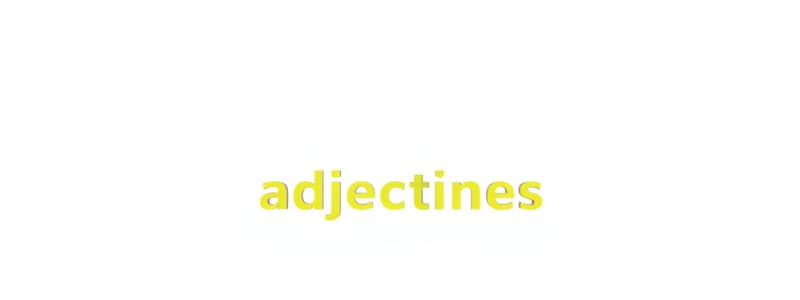Podcast
Questions and Answers
Which of the following is the correct superlative form of 'bad'?
Which of the following is the correct superlative form of 'bad'?
- badder
- more bad
- baddest
- worst (correct)
When should the comparative form of an adjective be used?
When should the comparative form of an adjective be used?
- When the sentence is in the past tense
- When comparing exactly two items (correct)
- When comparing three or more items
- When describing any single item
What characteristic defines an adjective as 'irregular' in terms of comparison?
What characteristic defines an adjective as 'irregular' in terms of comparison?
- It does not follow normal '-er' and '-est' rules (correct)
- It is used in idiomatic expressions
- It is used to modify a plural noun
- It has more than one syllable
Which of these sentences correctly uses the superlative form of an irregular adjective?
Which of these sentences correctly uses the superlative form of an irregular adjective?
Which adjective has the comparative form of ‘more’?
Which adjective has the comparative form of ‘more’?
Flashcards
Irregular Adjectives
Irregular Adjectives
Adjectives that don't follow the regular rules of comparison, like 'good', 'bad', 'much', and 'many'.
Comparative Degree
Comparative Degree
The form of an adjective used to compare two things. It usually ends in '-er' or uses the word 'more'.
Superlative Degree
Superlative Degree
The form of an adjective used to compare three or more things. It usually ends in '-est' or uses the word 'most'.
Positive Degree
Positive Degree
Signup and view all the flashcards
Idiomatic Usage
Idiomatic Usage
Signup and view all the flashcards
Study Notes
Irregular Comparison of Adjectives
- Adjectives describe nouns and pronouns, often changing form to show degrees of comparison (e.g., bigger, biggest, more beautiful, most beautiful).
- This isn't always a straightforward grammatical process. Some adjectives (irregular adjectives) deviate from standard comparison patterns, like "good," "bad," and "much/many".
The Irregular Comparison of 'Good'
- Positive: good
- Comparative: better
- Superlative: best
The Irregular Comparison of 'Bad'
- Positive: bad
- Comparative: worse
- Superlative: worst
The Irregular Comparison of 'Much' and 'Many'
- Positive: much/many
- Comparative: more
- Superlative: most
General Rules for Irregular Degree of Adjectives
- These irregular forms must be memorized for accurate use.
- Other adjectives follow regular comparative/superlative structures (e.g., tall—taller—tallest).
Factors Affecting the Choice of Comparative or Superlative
- Sentence context determines the needed degree of comparison.
- Choosing the correct degree (comparative or superlative) depends on whether two items (comparative) or more than two items (superlative) are being compared.
Examples of Usage
- He is better at that than I. (Comparative – comparing two)
- I think she is the best singer. (Superlative – comparing more than two)
- The most beautiful flowers are displayed today. (Superlative – comparing more than two)
Idiomatic Usage and Exceptions
- Some expressions use comparative/superlative adjectives in unusual ways, often with prepositions. These exceptions require specific knowledge beyond general rules.
Studying That Suits You
Use AI to generate personalized quizzes and flashcards to suit your learning preferences.




